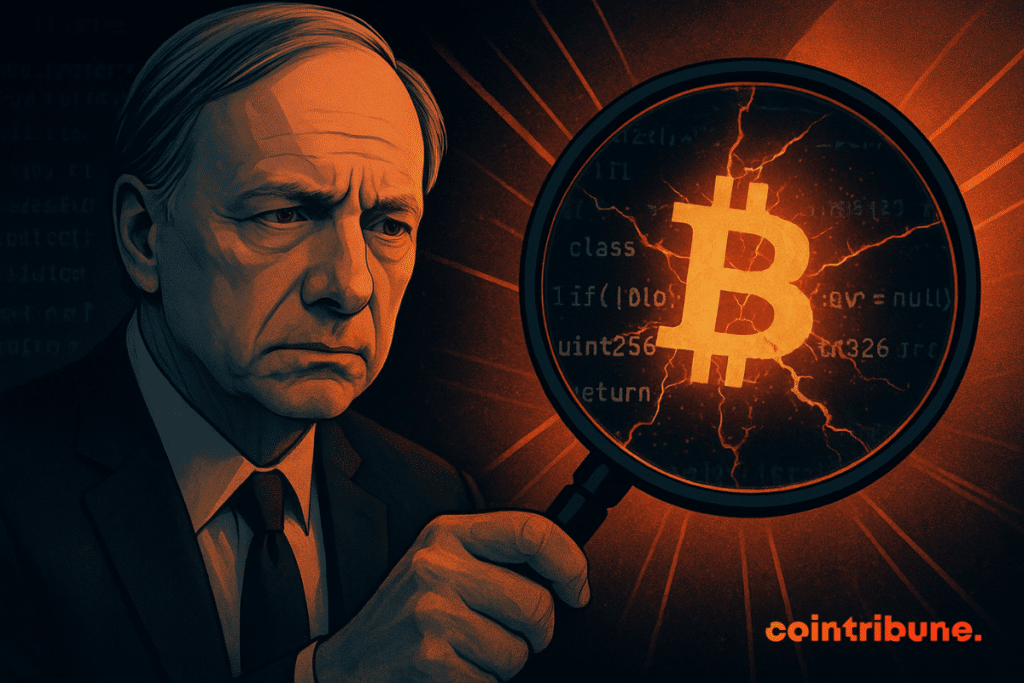Ray Dalio Flags Bitcoin’s Code as a Weakness, Sparks Pushback from Crypto Analysts
Ray Dalio, founder of Bridgewater Associates, has flagged Bitcoin’s code as a potential weakness, raising doubts about its long-term viability. His remarks have triggered pushback from the crypto community, with analysts defending Bitcoin’s resilience, transparency, and proven record as a store of value.

In brief
- Ray Dalio highlights Bitcoin’s code and transparency as obstacles to its adoption as a global reserve currency.
- Crypto analyst Adam Livingston defends Bitcoin, arguing that transparency is a key strength that mitigates systemic financial risks.
- Bitcoin, now at $122,000 with a $2.4 trillion market cap, has processed $10 trillion in on-chain transactions since its launch.
- Despite concerns, Dalio admits Bitcoin is “hard money” and holds a small allocation as a hedge against volatility.
Dalio Warns Bitcoin’s Code Limits Reserve Currency Potential
Speaking on The Master Investor Podcast, Dalio questioned whether Bitcoin could ultimately serve as a full substitute for money, despite its growing role as a store of wealth.
He noted that Bitcoin has many characteristics associated with money, including its limited supply and ability to facilitate transactions worldwide.
It is limited in its supply. It has certain transaction benefits very easily all around the world. You can transact in it. And so it has those elements.
Ray Dalio
However, Dalio questioned the OG crypto’s chances of ever being adopted as a reserve currency. He pointed to its lack of privacy, noting that governments can easily track transactions on the network. In his view, this transparency makes it unlikely that central banks will embrace Bitcoin in the same way they hold traditional reserve assets.
The veteran investor argued that while Bitcoin functions as a medium of exchange to some extent, it serves more effectively today as a store of wealth. He also stressed that questions remain about whether its code could be compromised or subjected to government interference.
Crypto Analysts Push Back Against Dalio’s Remarks
Dalio’s remarks quickly drew responses from the crypto community. Adam Livingston, a well-known cryptocurrency analyst, criticized Dalio’s assessment, calling it FUD. Livingston argued that Bitcoin’s transparency—framed by Dalio as a weakness—is actually one of its greatest strengths.
He added that this transparency helps prevent the kind of opacity that contributed to the 2008 financial crisis. According to the market commentator, BTC—currently trading at $122,000—has already established itself as a reliable store of wealth.
In just 16 years, it has grown into a $2.4 trillion asset, outperforming both gold and major fiat currencies in long-term purchasing power. Livingston also pointed to the network’s scale, noting that it has processed over $10 trillion in on-chain transactions.
The analyst dismissed the idea that Bitcoin’s cryptographic foundation could be compromised. He emphasized that the SHA-256 algorithm, which secures Bitcoin transactions, has withstood extensive global testing and remains unbroken. Livingston added that concerns about the code being vulnerable are speculative and lack technical evidence.
Dalio Still Recognizes Bitcoin’s Strengths
Even as he highlighted concerns, Dalio has acknowledged Bitcoin’s role as a form of “hard money.” With a fixed supply of 21 million coins, Bitcoin shares traits with scarce assets such as gold and silver. In previous comments, he even suggested that up to 15% of a portfolio could be allocated to Bitcoin as a hedge against market volatility.
Dalio revealed that he personally holds Bitcoin, though his allocation remains small. He made his first purchase in 2021 after years of skepticism, but continues to maintain only limited exposure.
His balanced position mirrors that of other prominent investors, such as Robert Kiyosaki, who has repeatedly urged investors to diversify their portfolios with Bitcoin, silver, and gold. Both figures view Bitcoin as a potential safeguard in times of financial instability, although they differ on its long-term role as a form of money.
Maximize your Cointribune experience with our "Read to Earn" program! For every article you read, earn points and access exclusive rewards. Sign up now and start earning benefits.

James Godstime is a crypto journalist and market analyst with over three years of experience in crypto, Web3, and finance. He simplifies complex and technical ideas to engage readers. Outside of work, he enjoys football and tennis, which he follows passionately.
The views, thoughts, and opinions expressed in this article belong solely to the author, and should not be taken as investment advice. Do your own research before taking any investment decisions.